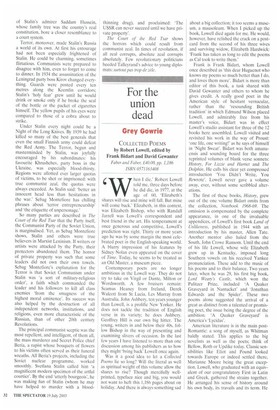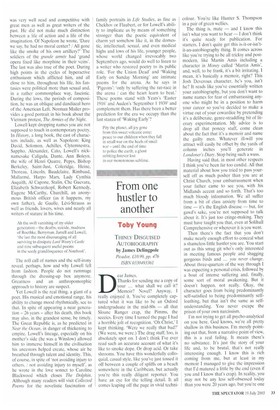For the union dead
Grey Gowrie
COLLECTED POEMS by Robert Lowell, edited by Frank Bidart and David Gewanter Faber and Faber, £40.00, pp. 1,186 ISBN 0571163408 cw hen I die,' Robert Lowell
told me, three days before he did die, in 1977, at the
age of 60, 'Elizabeth's shares will rise and mine will fall. But mine will come back.' Elizabeth, in this context, was Elizabeth Bishop, who with Randall Jarrell was Lowell's correspondent and best friend in the art. His temperament at once generous and competitive, Lowell's prediction was right. Thirty or more years ago he was by some margin the most celebrated poet in the English-speaking world. A blurry impression of his features by Sidney Nolan even appeared on the cover of Time. Today, he seems to be treated as an Old Master, a museum piece.
Contemporary poets are no longer ambitious in the Lowell way. They do not try to take on Virgil or Dante, Milton or Wordsworth. A few bruisers remain: Seamus Heaney from Ireland, Derek Walcott from St Lucia, Les Murray from Australia. John Ashbery, ten years younger than Lowell, is a prolific New Yorker. He does not tackle the tradition of English verse in its variety; he does Ashbery. Geoffrey Hill is our own big hitter. The young, writers in and below their 40s, follow Bishop in the way of presenting and examining slivers of occasion. In the last few years I have listened to more than one discussion among his publishers as to how they might 'bring back' Lowell once again.
Was it a good idea to let a Collected Poems lie so long? Will the literal as well as spiritual weight of this volume allow the shares to rise? Though mercifully wellprinted, typeface nice and big, you would not want to heft this 1,186 pages about on holiday. And there is always something sad
about a big collection; it too seems a museum, a mausoleum. When I picked up the book, Lowell died again for me. He would, however, have relished the crack on a postcard from the second of his three wives and surviving widow, Elizabeth Hardwick: 'Frank has taken as long to edit the poems as Cal took to write them.'
Frank is Frank Bidart, whom Lowell once described as 'this dear Huguenot who knows my poems so much better than I do, and loves them more'. Bidart is more than editor of this book, a task shared with David Gewanter and others to whom he gives credit. A really good poet in the American style of hesitant vernacular, rather than the 'resounding British tradition' in which Edmund Wilson placed Lowell, and admirably free from his master's voice, Bidart was in effect Lowell's studio assistant for three of the 12 books here assembled. Lowell visited and revisited his work in the way of Proust: 'one life, one writing!' as he says of himself in 'Night Sweat'. Bidart was both amanuensis and sounding board for the three reprinted volumes of blank verse sonnets: History, For Lizzie and Harriet and The Dolphin. He calls his clear yet compressed introduction 'You Didn't Write, You Rewrote'. Lowell never gave a volume away, ever, without some scribbled alterations.
The first of these books, History, grew out of the one volume Bidart omits from the collection, Notebook 1968-69. The omission is compensated by the complete appearance, in one of the invaluable appendices, of Lowell's first book Land of Unlikeness, published in 1944 with an introduction by his master, Allen Tate. Another mentor also haled from the South, John Crowe Ransom. Until the end of his life Lowell, whose wife Elizabeth grew up in Kentucky, imposed long Southern vowels on his received Yankee pronunciation. These add to the music of his poems and to their balance. Two years later, when he was 29, his first big book, Lord Weary's Castle, which won the Pulitzer Prize, included 'A Quaker Graveyard in Nantucket' and 'Jonathan Edwards and the Spider'. These two poems alone suggested the arrival of a great as distinct from a talented or promising poet, the issue being the degree of the ambition. 'A Quaker Graveyard' is America's `Lycidas'.
American literature is in the main postRomantic: a song of myself, as Whitman baldly stated. This applies to the big novelists as well as the poets; think of Bellow, Roth or Updike today. Classic sensibilities like Eliot and Pound looked towards Europe or indeed settled there, Marianne Moore being the great exception. Lowell, who graduated with an equivalent of our congratulatory First in Latin and Greek, gathered the strains together. He arranged his sense of history around his own body, its travails and its term. He was very well read and competitive with great men as well as great writers of the past. He did not make much distinction between a life of action and a life of the imagination. Of Napoleon he wrote, 'Dare we say, he had no moral center? / All gone like the smoke of his own artillery?' The soldiers of the grande armee had 'grand opera fixed like morphine in their veins'. The last was also true of the poet. During high points in the cycles of hyperactive enthusiasm which afflicted him, and all close to him, throughout his life, his fantasies were political more than sexual and, in a rather commonplace way, fascistic. During the lows, the periods of composition, he was an oblique and dandiacal hero of the American Left. Norman Mailer provides a good portrait in his book about the Vietnam protest, The Armies of the Night.
Lowell kept dropping names you are not supposed to touch in contemporary poetry. In History, a long book, the cast of characters include, as well as Napoleon: King David, Solomon. Achilles, Clytemnestra, Sappho, Alexander, Cato, Lowell's nicknamesake Caligula, Dante, Ann Boleyn, the wife of Henri Quatre, Pepys, Bishop Berkeley, Saint-Just, Coleridge, Heine, Thoreau, Lincoln, Baudelaire, Rimbaud, Mallarme, Harpo Marx, Lady Cynthia Asquith, Al Capone, Stalin, Che Guevara, Elizabeth Schwarzkopf, Robert Kennedy, Eugene McCarthy, Churchill, an anonymous British officer (as it happens, my own father), de Gaulle, Levi-Strauss as well as friends, lovers, wives and nearly all writers of stature in his time.
Ah the swift vanishing of my older generation — the deaths, suicide, madness of Roethke. Berryman. Jarrell and Lowell, 'the last the most discouraging of all surviving to dissipate Lord Weary 's Castle and nine subsequent useful poems in the seedy grandiloquence of Notebook'.
The roll call of names and the self-irony reveal, perhaps, how and why Lowell fell from fashion. People do not rummage through the dressing-up box anymore. Greatness and an anthropomorphic approach to history are suspect.
Yet Lowell is the real thing, a giant of a poet. His musical and emotional range, his ability to change mood rhythmically, see to that. In spite of appearing a near generation – 26 years – after his death, this book may also, in the grandest sense, be timely. The Great Republic is, as he predicted in Near the Ocean, in danger of thickening to empire. Lowell's lineage, especially on his mother's side (he was a Winslow) allowed him to immerse himself in the civilisation his ancestors helped create, whose air he breathed through talent and identity. This, of course, in spite of 'not avoiding injury to others, / not avoiding injury to myself', as he wrote in the love sonnet to Caroline Blackwood which closes The Dolphin. Although many readers will visit Collected Poems for the novelistic fascination of family portraits in Life Studies, as fine as Chekhov or Flaubert, or for Lowell's ability to implicate us by means of something stronger than the poetic equivalent of charm yet somehow like it, in the domestic, intellectual, sexual, and even medical highs and lows of his life, younger people, whose world changed irrevocably two Septembers ago, would do well to listen to a writer who restored poetry to its public role. 'For the Union Dead' and 'Waking Early on Sunday Morning' are intimate poems for the arena. As he says in 'Pigeons': 'only by suffering the rat-race in the arena / can the heart learn to beat.' These poems stand with Yeats's 'Easter 1916' and Auden's 'September 11939' and complement them. Has there been a better prediction for the era we occupy than the last stanza of 'Waking Early'?
Pity the planet, all joy gone from this sweet volcanic cone; peace to our children when they fall in small war on the heels of small war — until the end of time to police the earth, a ghost orbiting forever lost in our monotonous sublime.



























































 Previous page
Previous page